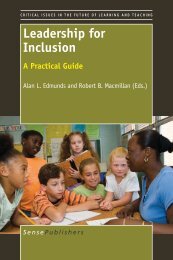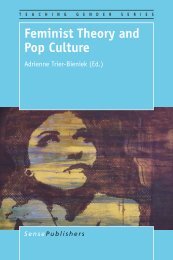1177-threshold-concepts-and-transformational-learning
1177-threshold-concepts-and-transformational-learning
1177-threshold-concepts-and-transformational-learning
- No tags were found...
You also want an ePaper? Increase the reach of your titles
YUMPU automatically turns print PDFs into web optimized ePapers that Google loves.
TRANSCENDING DISCIPLINARY BOUNDARIESIts application in my discipline-specific work was motivated by – <strong>and</strong> done inpreparation to address – the questions of how to engender reflective responses inall students at all times, or, among those students who do respond defensively, howto cultivate transition from defensiveness to reflectiveness (Schwartzman 2007,2008). Because the conceptual framework organizes exploration around studentresponse to what appears unknowable, rather than discipline content, it transcendsdisciplinary boundaries.Organization of the PaperThe paper begins with an introduction to Threshold Concepts (TC) <strong>and</strong> <strong>threshold</strong><strong>concepts</strong> (tc) <strong>and</strong> proceeds in sequence: an exposition of motivation <strong>and</strong>preparation for defining a theoretical foundation (in several parts); a comparisonof process <strong>and</strong> structure in the TC community with that of a classical scientificcommunity of practice <strong>and</strong> research, which illuminates the process of generatingc<strong>and</strong>idate theoretical foundations; a literature-based description of reflective <strong>and</strong>defensive responses <strong>and</strong> the rupture in knowing that gives rise to them, as well asthe larger context of <strong>learning</strong> in which all three are situated; an excerpt of studentfeedback data in my course, from which the work underlying this paperoriginated; a proposal of the aggregated two response types as a disciplineindependenttheoretical foundation, both for this investigation specifically, <strong>and</strong>by extension for TC scholarship more generally; application <strong>and</strong> evaluation ofthe c<strong>and</strong>idate theoretical foundation <strong>and</strong> the associated explanatory theorydefined by it; a view toward possible future work.The ConceptTHRESHOLD CONCEPTS (TC) AND <strong>threshold</strong> <strong>concepts</strong> (tc)TC: informally. The frame of Threshold Concepts (TC) is generally understoodas an orientation in teaching, for any discipline, that is concerned with howto support students’ <strong>learning</strong> particularly challenging material, aka <strong>threshold</strong><strong>concepts</strong> (tc’s).tc: more formally, definitions. Meyer <strong>and</strong> L<strong>and</strong> speak of tc’s as conceptualgateways or portals to an otherwise inaccessible – <strong>and</strong> unknown – conceptual spaceor way of underst<strong>and</strong>ing. Such conceptual gateways [are characterized as]transformative (occasioning a significant shift in the perception of a subject),irreversible (unlikely to be forgotten, or unlearned only through considerable effort),<strong>and</strong> integrative (exposing the previously hidden interrelatedness of something).Transition through the portal to the new space often poses difficulty <strong>and</strong> isexperienced as troublesome. The new space is itself bounded (bordered by <strong>threshold</strong>sinto further, currently inaccessible conceptual territory) (Meyer & L<strong>and</strong>, 2005,pp. 373–377).23




